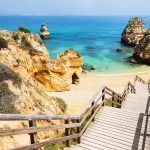Novobanco: António Ramalho leaves and new CEO Mark Bourke takes the helm
After steering Novobanco through a six-year hurricane of turmoil, painful restructuring and media and parliamentary controversy, CEO António Ramalho has left the bank for Swiss pastures. He is replaced by Mark Bourke. (Pictured)
Ramalho joined the bank on 1 August 2016. After six years the bank is finally turning a profit after receiving an estimated €6Bn-11Bn funding — depending on who you read or talk to — from Portugal’s banking system and the public purse, and is now expected to be sold or acquired and merged with another bank; either national or international.
During that time a clean sweep was carried out on the bank’s balance books, removing toxic assets inherited from the collapse of the bank it was created from in 2014 – Banco Espírito Santo.
However, Ramalho cleaned up the bank using both the State and the other banks funds through capital injections of billions from a Resolution Fund which included a Contingent Capital Agreement as the alternative of letting BES collapse in an uncontrolled and disordered way.
This “would have contaminated the entire Portuguese banking system and cost the tax payer and banks far more” (€17 million at least) admitted Ramalho in a conversation this publication had with him last month.
“There was no other choice, no one wanted to buy the bank, the only entity prepared to buy part of it was Lone Star, there were no other interested parties”, he told Essential Business.
António Ramalho said he “loved an almost impossible challenge” and “relished the storm” and is proud of the fact he took a hopeless situation — a sinking ship — repairing the holes in the hull, offloading the toxic cargo that was dragging it down and threatened to make it sink, and somehow managed to repair it, and set course for some kind of safe harbour in which at least now there may be the chance of a buyer or a merger deal.
Technically, Novobanco is now in a much better situation to take advantage of the Euro Zone’s new monetary policy.
In March this year, when Novobanco posted its first profits of €142.7 million for Q1 (+€72 million like-for-like on 2021), António Ramalho made a “total commitment” with the bank until the end of his contractual term in 2024.
This was at a time when the news was splattered with the Red Card scandal in which a football mogul who owed millions to the bank was under police investigation alongside one its former directors over allegations of preferential treatment that prejudiced the bank financially.
Shortly after, António Ramalho announced to Jornal de Negócios he would quit his post at the age of 62 for family reasons.
As he told me last month, he has plans in Switzerland for a few months, and now, in fact, it is learnt that he will take a Non-Executive Board Directors Diploma or IMD which would enable him to sit on the board of an institution in a non-executive capacity.
Ramalho has had quite a career. Before Novobanco he worked for several public companies in executive functions including rail network company Infraestruturas de Portugal (2015-2016), road network company Estradas de Portugal (2012-2015), and railways and rolling stock company Comboios de Portugal. (2004-2006) He was Vice-President of BCP (2010-2012), ran Unicre, was an executive director at Totta (1990-2003) and at Mundial Confiança group (1990-2000).
Taking his place in an internal appointment is the Irish executive Mark Bourke who was the financial director of Novobanco and was the man chosen by majority shareholder US equity firm Lone Star.
The objective now is to prepare the bank for sale in which Lone Star will recover its €1Bn investment that it made in 2017.
When Novobanco was set up in 2014, with around €12Bn of problematic loans, around a third of its portfolio was poisoned as a result of its BES legacy.
And although BES remained as a ‘bad bank to hold the worst of these toxic assets, and Novobanco was set up as a good bank to hold the non-toxic assets, the reality was that the bank was saddled from the start with a huge millstone of troublesome, but technically recoverable assets (recoverable to some extent and at some price, usually knock-down), and still held these in 2016 when Ramalho came on the scene.
At that time, Portugal was under pressure from Brussels to sell the bank after the first attempt to sell it failed in 2015.
Lone Star stepped in at the 11th hour in 2017 when all deadlines to sell off the bank had been exhausted, to avoid the bank’s closure. The equity “vulture” fund took a 75% of the bank in exchange for a capital injection of €1Bn.
However, the move also paved the way to the triggering of a Contingent Capital Mechanism with €3.89Bn.
The Prime Minister, António Costa famously said: “The tax payer will not pay (for Novobanco) either directly or indirectly. The bank’s capital needs will be met by the Resolution Fund from which it has its donations secured by the banks”.
This utterance has gone on to haunt the Portuguese government ever since, because Novobanco has since received millions of euros, and Portugal’s Tribunal de Contas which monitors public spending thinks that the tax payer did, in fact, foot the bill for the bank.
In his defence, António Ramalho argued that the bank was the “most audited bank in Portugal’s history” and that he was always open to clear up any doubts.
As to the restructuring, Novobanco today is much slimmer than it was in 2014, but more efficient and robust.
But its removal from life-support and return to some semblance of health after years of rehab has been at a cost that even Betty Ford would have winced at.
Since 2016, the bank has let go around 2,000 staff (-30% of the workforce) and 200 branches were closed. It now has 310. The bank’s half year results are expected to be released this week and post a positive but modest profit.










